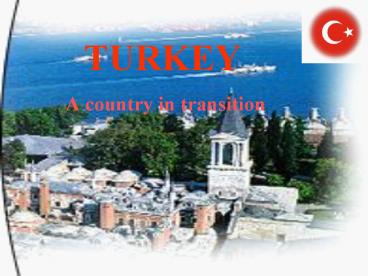TURKEY - PowerPoint PPT Presentation
1 / 21
Title: TURKEY
1
TURKEY
- A country in transition
2
A land with plenty of natural beauties
3
And historical wealth
4
With rich cultural heritage
5
The pride of Turks The best of WORLD CUP 02
Turkish National Soccer Team
Galatasaray
The best team in Europe
6
Geo-political location
- Cradle of many civilizations
- Melting pot of cultures
- The land that
- Asia and Europe meet
- Provides a natural passage from Black Sea to
Mediterranean Sea - Several religions (including Christianity and
Islam) meet and mix
7
Modern Turkey bridges them all.
8
Historical Background
Pre-Turkish period (from antiquity until 11th
Century)
- Hittites (2000-1000 BC)
- Phrygians, and Lydian's
- (1000-550 BC)
- Hellenistic period
- (800-130 BC)
- Romans
- (130 BC- 395 AD)
- Byzantine era (395-1453)
9
Ancestral Homeland of Turkic people
Anatolian Seljuks
Seljuks
10
Rise of Ottoman Empire (14th and
15th Century)
11
(No Transcript)
12
(No Transcript)
13
Aftermath of WWI
- Ottoman Empire and her allies (Germany,
Austro-Hungarian Empire and Bulgaria) lost the
war - Allied Powers decided to partition Ottoman
territories in the Middle East and create new
states - Invasion of Turkish territories in Thrace and
Anatolia by Britain, France, Italy and Greece - Turkish resistance to foreign invasion begins
with the leadership of Mustafa Kemal (1919) - Turkish Independence War (1919-1922), all the
territories in Thrace and Anatolia are regained - Founding of Turkish Republic (29 October 1923)
14
Turkish Republic (1923)
15
Transition form an Empire to a Republic
- Change in political system
- Nationalism and westernization, unitary state,
parliamentary democracy. Ottoman dynasty exiled. - Social Reforms
- Secularism, abolition of Caliphate.
- New civil and penal codes, metric system of
units. - Switch to Latin script, abolition of old
education system. - Rights of Women.
- Westernization in arts, literature and sciences.
- Economical system
- Emphasize on industrialization, encouragement of
private enterprise, state enterprise in heavy
industry. - Self-sufficiency in traditional economic
activities.
16
Turkey during WWII
- Mustafa Kemal Atatürk dies (1938)
- Turkey is neutral till very end of WWII
- Crisis of Straits
- Multiparty system
17
Cold War and its consequences(another transition
period)
- Turkey joins UN forces fighting in Korea (1950)
- Concerns about Soviet ambitions, Turkey becomes a
full member of NATO (1952) - Rise of economical and social problems, concerns
about civil liberties - 1960 military coup, return to democracy in early
1963 - Cyprus crisis
- Oil crisis and its impact on Turkish economy
- Turmoil of late 70s, 1980 military coup, return
to democracy in 1983
18
Post Cold War Turkey
- New relations with Caucasian states, Central
Asian Turkic states and Russia - New relations with Balkan states
- Gulf War and its consequences for Turkish economy
and political thought - PKK terrorism
- Uncertainty in the Middle East, Turkeys unique
position
19
Challenges in the 21st Century
- Economy
- Rise of fundamentalism
- Rapid urbanization
- Human rights
- Political instability in the region
20
Outlook for the future
is bright!
21
References and sources of information
- Books
- S.J. Shaw, History of Ottoman Empire and Modern
Turkey, Cambridge, 1976 - B. Lewis, The Middle East, Simon Schuster,
1995 - P.B. Golden, Introduction to History of Turkic
Peoples, O. Harrassowitz, 1992 - J.A. Garraty and P.Gay, The Columbia History of
the World, Harper Row, 1972 - Web sites
- Turkish embassy website www.turkey.org/
- Turkish Ministry of Culture website
www.kultur.gov.tr/ - US Library of Congress website
http//lcweb2.loc.gov/frd/cs/troc.html - Turkish Odyssey website www.turkishodyssey.com/t
urkey/history/
Tesekkür ederim. Hosçakaliniz!

